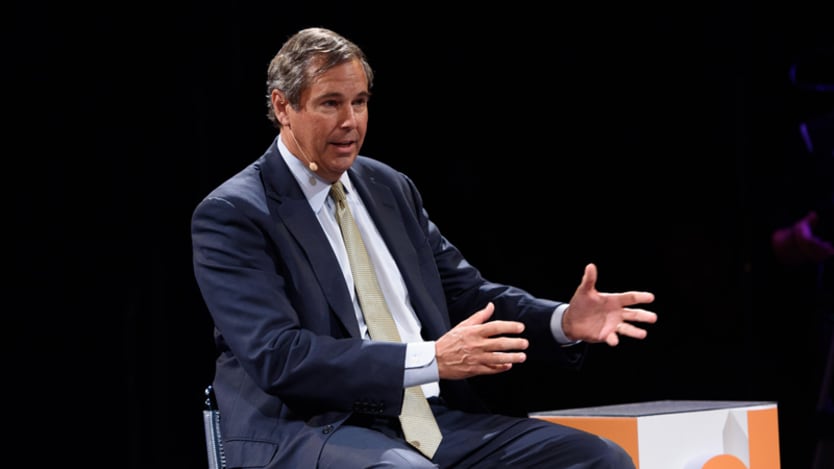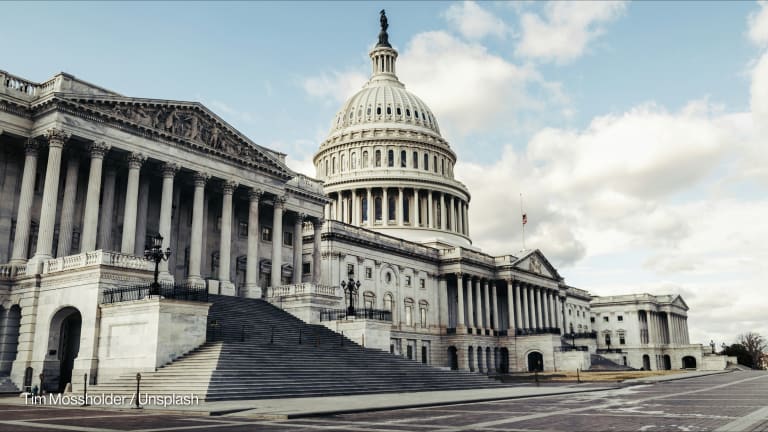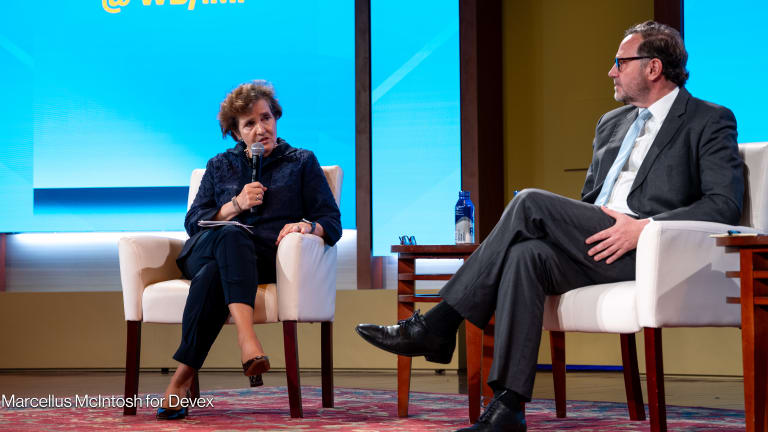
WASHINGTON — As the BUILD Act makes its way through the legislative process, concerns remain about exactly how the proposed United States development finance institution would work with the U.S. Agency for International development, what its social and environmental standards would be, and how its mandate will be interpreted.
The Better Utilization of Investment Leading to Development Act was introduced in late February by a bipartisan group of lawmakers in the House of Representatives and the Senate. The bill is currently awaiting a markup in the Senate committee. If passed, the landmark legislation would create a new agency combining the Overseas Private Investment Corporation and USAID’s Development Credit Authority, as well as expand U.S. development finance capabilities. But much remains unanswered, including how, precisely, the new agency will work with USAID.
More coverage from Devex World:
► At Devex World, development leaders begin to embrace what they don't know
On Tuesday, at Devex World in Washington, D.C., Devex sat down with Ray Washburne, OPIC’s chief executive officer, to discuss his first nine months on the job and the issue of USAID linkages, as well as some of the other concerns that are being raised as the U.S. Senate Committee on Foreign Relations prepares to markup the bill.
The conversation has been edited for length and clarity.
You’re somewhat new to development; you started on the job in August, and you didn’t come from a development background. Tell us something that surprised you about development finance as you’ve sunk your teeth in?
I built a business of more than 3000 employees. I’ve been in manufacturing, the restaurant business, real estate — so I’ve had a long, long experience. I helped found three different banks, so I brought a lot of things that I think have helped transform OPIC’s goals and what we’re trying to be.
When I showed up, as all you know, OPIC had been zeroed out in the president's budget, and a lot of people asked, especially in my Senate confirmation, why am I taking a job that's being eliminated.
I was former finance chairman of the Republican Party, and so I had a lot of relationships up on the Hill, I had a lot of relationships within the White House from my experience on working on the campaign. And so I was able to go in and really sell to the administration what OPIC is and should be and can be.
“I've been to over 20 countries, I've seen a lot of projects that we would have liked to have participated in that we couldn’t, because other countries cut us out.”
—Since that time, there's new legislation going through called the BUILD Act that's not only going to strengthen OPIC, but going to double our size from $29 billion to $60 billion, give us equity authority, and also give us the ability to do feasibility studies and other things.
So, I didn't come in from the bureaucratic side or the academic side, I came in from the practical business side and I think that's done a lot to help propel us forward.
You mentioned some of the new authorities that are featured in the BUILD Act. Tell us a little bit about what these new authorities — the equity authority, grant-making ability to do some technical assistance, and raising this cap — would mean for OPIC. Why do you need these new tools? Why does U.S. development finance need to be transformed?
OPIC was established in 1971 and really hasn't changed in almost 50 years. The world has changed in every way — including the finance world — and so we were cut out of a lot of deals.
Coming from the private sector — realizing a lot of projects just can't sustain, having all debt on the project or a lot of senior debt — you had to have equity. Plus, we needed to play on the world stage with other DFIs, other governments, and their development authorities.
I've been to over 20 countries, I've seen a lot of projects that we would have liked to have participated in that we couldn’t, because other countries cut us out. What brought this to the forefront was in 2008: OPIC was always senior debt, and as other countries just got their equity absolutely wiped out, OPIC went along its merry way as being senior. I was at the G-7 meeting this past weekend and met with a lot of the DFIs and they couldn't be more happy to have us in there as part of the brotherhood now to go forward.
At the G-7, there was an announcement that G-7 countries will be joining an OPIC initiative in some way and also making commitments to investing in women's economic empowerment. OPIC made this commitment earlier this year with its 2X initiative. Can you tell us a little bit about OPIC’s priorities today, where you’re going to focus your funds, and how you're deciding what's important to focus on?
Sure. Well, I'll speak to the women's initiative. First thing I did, when I was sworn in last August, was set up a women’s initiative — I staffed it and came in, and we committed $350 million to get it started. The very first loan we did was to a bank in Costa Rica where it was going to small- and medium-sized business — a $60 million commitment — and we required 20 percent of it to go to women businesses.
We did that the first week I was there; we since have catalyzed that up to about a billion dollars worth of investment. As I announced at the G-7, with other DFIs we're going to put $3 billion to work this year in women-based and women-owned businesses.
You've also announced other commitments in some other focus areas, including the Northern Triangle...
OPIC is really a tool of foreign policy for the U.S. government and so you need to have a much more focused investing philosophy. To this administration, the important areas are the Northern Triangle, Central America, which has a 50 percent unemployment rate for men under 30, so what happens, they get in activities they shouldn't be, doing things because they need jobs.
Yesterday, I had a group from El Salvador in our office — I was in Honduras two weeks before that. We just financed a geothermal plant in Honduras. It will provide electricity for 40,000 homes and businesses, so getting economic activity in the Northern Triangle is top priority.
Indo-pacific is also a big priority for us, Pakistan all the way around to Vietnam. We've been very active there — and also in Africa. I leave in two weeks to go on a two-week trip throughout Africa, that's our largest concentration right now.
I want to go back to the BUILD Act because there have been some concerns in the development community about some aspects of the BUILD Act and how the new DFC would be built and run. USAID Administrator Mark Green said “our focus continues to be making sure that it's not simply about the money than it is about sound development outcomes” and so I wanted to ask: How do you interpret the mission of the new DFC and ensure that it retains a strong development focus?
We look at a multiplier effect on everything we do and every new job created in a country creates between 5 to 7 ancillary jobs around it, so the important thing to us is how can we create jobs — jobs create stability in a country and that creates stable political environments. So unlike just going out and building a highway, we want to be sure that that actually has an effect — such as bringing agriculture out of the mountains and into a port, getting it out of there. So we don't look at things as just a pure aid, it's got to have the multiplier effect attached to it.
—
One of the other issues that's been raised is about what the relationship will be between USAID and the new DFC. What do you think that relationship will look like? What do you think needs to be done to incentivize teams to work together to ensure that USAID’s vision on development policy is guiding the work of the new DFC?
As you know USAID has offices throughout the world in almost every country. OPIC is open in 130 countries, we currently do business in 90. I have 675 projects in 90 countries but with this new authority, we have to have the ability to sell ourselves. We have to be much more outward facing in looking for projects. OPIC, for so many years, haven’t been proactive, they've been reactive on taking phone calls, I've completely turned it around, we're a very outward facing agency now to business and to governments.
I need USAID — all our 300 employees are based here, in D.C. I don't have field offices. In the past USAID, as well as the commerce department in each embassy, don't know what OPIC is or what OPIC can do.
In the past, USAID had really one thing to do, and now, with all the different authorities, they'll be able to do more. It's going to take USAID and expand their capabilities by a factor of seven.
There was an op-ed in The Hill last week that talked about how OPIC has, over the years, developed some fairly strong environmental and social policies that help prevent or limit its support of harmful projects and protect local communities and the environment. It went on to say that that progress is in jeopardy with this new legislation because the legislation does not require the new DFC to follow those safeguards. So how will OPIC policies and procedures — from the development matrix it uses to make investment decisions, to environmental impact assessments to the office of accountability — translate to the new DFC?
Everything we do is looked at through the lens of the highest international standards whether it's environmental, labor practices — all those. And so that article was interesting to me, in that I don't think they really understood the processes as we go through at OPIC. The standards that are set there and also the board directives that we get.
I think the concern was that those policies wouldn't carry over into the new DFC if they weren't required to. So if you're leading the new DFC, assuming this legislation is passed, do you commit to following the same standards that we have today?
Oh, absolutely. OPIC has always followed the highest standards and will continue to do so.
So the bill has made it through the House Foreign Affairs Committee, and is awaiting a markup in the Senate. You mentioned your close relationships on the Hill and with the White House, what do you think the chances are that this bill will pass? Where do things stand?
We're very encouraged by the bipartisan support we have on both sides, both D’s and R’s are very enthusiastic behind it. The bill is gonna be marked up here in the next week or two by the Senate — you know we're out of the house, which is great — and then once that is done hopefully we get voted out of committee pretty quickly.
We've got the support of Sen. Bob Corker and Sen. Chris Coons, really pushing hard to get it get it done. The bill expires December 31 so we're pushing to get it voted on by the summer recess or early fall. We're planning ahead, hoping, especially with this equity authority — that’s the big thing when we're in these conversations with people, that's the question everyone has.
I've heard some rumors that you might have interests or might be in the running for a cabinet position down the line. Do you think you'll be around to lead the new DFC if the bill passes?
Well look, I’ve got so much work to do this fall. I mean not only do I have to get the bill passed, with equity authority, I have to build an entirely new department within OPIC. So I've got a lot to do this summer.








